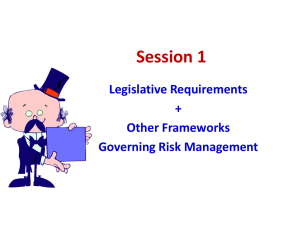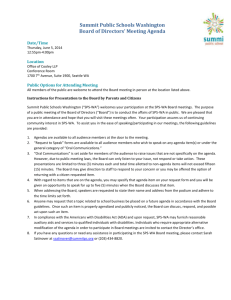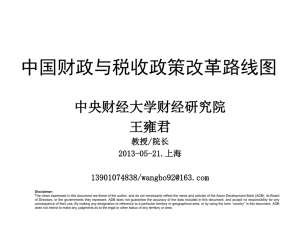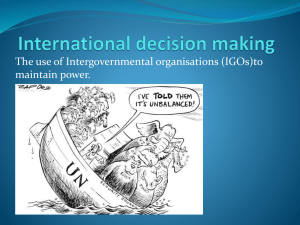The Intergovernmental Relations Bill, 2012
advertisement
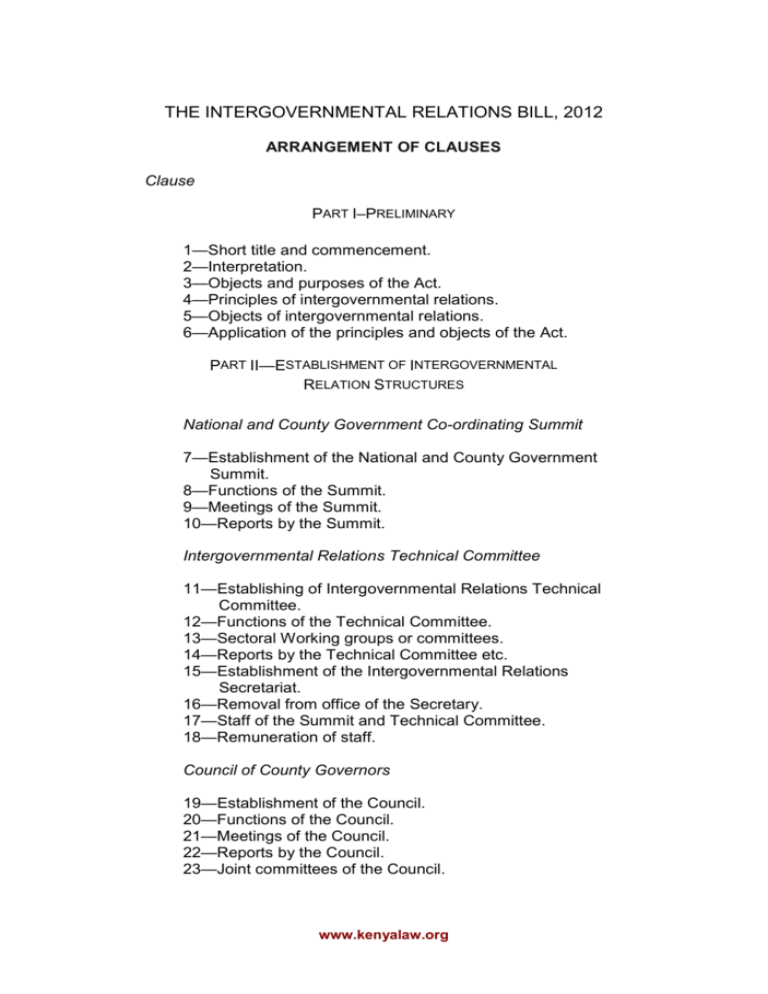
THE INTERGOVERNMENTAL RELATIONS BILL, 2012 ARRANGEMENT OF CLAUSES Clause PART I–PRELIMINARY 1—Short title and commencement. 2—Interpretation. 3—Objects and purposes of the Act. 4—Principles of intergovernmental relations. 5—Objects of intergovernmental relations. 6—Application of the principles and objects of the Act. PART II—ESTABLISHMENT OF INTERGOVERNMENTAL RELATION STRUCTURES National and County Government Co-ordinating Summit 7—Establishment of the National and County Government Summit. 8—Functions of the Summit. 9—Meetings of the Summit. 10—Reports by the Summit. Intergovernmental Relations Technical Committee 11—Establishing of Intergovernmental Relations Technical Committee. 12—Functions of the Technical Committee. 13—Sectoral Working groups or committees. 14—Reports by the Technical Committee etc. 15—Establishment of the Intergovernmental Relations Secretariat. 16—Removal from office of the Secretary. 17—Staff of the Summit and Technical Committee. 18—Remuneration of staff. Council of County Governors 19—Establishment of the Council. 20—Functions of the Council. 21—Meetings of the Council. 22—Reports by the Council. 23—Joint committees of the Council. www.kenyalaw.org 2 The Intergovernmental Relations Bill, 2012 PART III—TRANSFER AND DELEGATION OF POWERS, FUNCTIONS AND COMPETENCIES 24—Transfer and delegation of powers, functions and competencies. 25—Principles of transfer or delegation of powers, functions and competencies. 26—Agreements on transfer or delegation of powers, functions and competencies. 27—Service standards. 28—Criteria for transferring powers, functions and competencies. 29— Public participation. PART IV—DISPUTE RESOLUTION MECHANISMS 30—Application of this Part. 31—Measures for dispute resolution. 32—Dispute resolution mechanisms. 33—Declaration of a dispute as a formal dispute. 34—Procedure after declaration of a formal dispute. 35—Judicial proceedings. 36—Offence. PART V—MISCELLANEOUS PROVISIONS 37—Operational Expenses. 38— Regulations. SCHEDULE—PROVISIONS ON THE CONDUCT OF THE MEETINGS OF THE INTERGOVERNMENTAL STRUCTURES The Intergovernmental Relations Bill, 2012 3 THE INTERGOVERNMENTAL RELATIONS BILL, 2012 A Bill for AN ACT of Parliament to establish a framework for consultation and co-operation between the national and county governments and amongst county governments; to establish mechanisms for the resolution of intergovernmental disputes pursuant to Articles 6 and 189 of the Constitution, and for connected purposes ENACTED by the Parliament of Kenya, as follows— PART I—PRELIMINARY Short title and commencement.. 1. This Act may be cited as the Intergovernmental Relations Act, 2012 and shall come into operation upon the final announcement of the results of the first elections under the Constitution. Interpretation. 2. (1) In this Act, unless the context otherwise requires— "Cabinet Secretary" means the Cabinet Secretary for the time being responsible for matters relating to inter-governmental relations; "competencies" means powers given to a public authority in respect of a specific activity, which is key to ensuring the provision of a public service and includes powers of planning, regulating, setting standards, constructing, financing, managing, monitoring and evaluating, sanctioning or intervening in any way to ensure that a function is discharged; "Council" means the established under section 19; Council of County Governors "level of government" means the national and county level of government; "Secretariat" means the Intergovernmental Secretariat established under section 15; Relations 4 The Intergovernmental Relations Bill, 2012 "Summit" means the National and County Government Co-ordinating Summit established under section 7; "Technical Committee" means the Intergovernmental Relations Technical Committee established under section 11. Objects and purposes of the Act. 3. The objects and purposes of this Act are to— (a) provide a framework for consultation and co-operation between the national and county governments; (b) provide a framework for consultation and co-operation amongst county governments; (c) Establish institutional structures and mechanisms for intergovernmental relations; (d) provide a framework for the inclusive consideration of any matter that affects relations between the two levels of government and amongst county governments; (e) give effect to Articles 187 and 200 of the Constitution, in respect of the transfer of functions and powers by one level of government to another, including the transfer of legislative powers from the national government to the county governments; and (e) provide mechanisms for the resolution intergovernmental disputes where they arise. of Principles of intergovernmental relations. 4. The intergovernmental relations structures established under this Act shall be based on the following principles— (a) recognition of the sovereignty of the 'people as provided for under Article 1 of the Constitution; (b) inclusive and participatory governance; (c) respect for the functional and institutional integrity of the two levels of government; The Intergovernmental Relations Bill, 2012 (d) promotion of national values and principles of governance provided under Article 10 of the Constitution; (e) respect for the constitutional status of the levels of government and the institutions of government established at either level of government; (f) promotion of equality and equity in service delivery; (g) objectivity and impartiality in decision making; (h) the requirement for consultation and co-operation as provided under Article 6 (2) of the Constitution; (i) the need to minimize intergovernmental disputes while cooperating in exercising their functions; (j) promotion of accountability to the people in decision making and actions taken; and (k) institutionalized protection of marginalised groups. Objects of intergovernmental relations. 5. The objects of intergovernmental structures established under this Act include— (a) facilitating the realization of the objects and principles of devolution provided for under Articles 174 and 175 of the Constitution; (b) facilitating co-operation and consultation between = the national and the county governments and amongst county governments as provided under Articles 6 and 189 of the Constitution; (c) providing a forum for co-ordinating governments policies, legislation and functions; (d) providing a forum for sharing and disclosing of necessary data and information; (e) providing for mechanisms for the transfer of power, functions and competence to either level of government; and 5 6 The Intergovernmental Relations Bill, 2012 (f) promoting accountability between the two levels of government or amongst the county governments. Application of the principles and objects of the Act. 6. The principles and objects provided under sections 3, 4, and 5 shall apply to— (a) the national and county governments; (b) the intergovernmental relations structures established under this Act or any other written law; and (c) the dispute resolution mechanisms provided under this Act. PART II— ESTABLISHMENT OF INTERGOVERNMENTAL RELATIONS STRUCTURES National and County Government Co-ordinating Summit Establishment of the National and County Government Co-ordinating Summit. 7. (1) There is established a National and County Government Co-ordinating Summit which shall be the apex body for intergovernmental relations. (2) The Summit shall comprise— (a) the President or in the absence of the President, the Deputy President, who shall be the chairperson; and (b) the governors of the forty-seven counties. (3) The chairperson of the Council elected under section 19 shall be the vice-chairperson of the Summit. Functions of the Summit. 8. The Summit shall among others provide a forum for— (a) consultation and co-operation between the national and county governments; The Intergovernmental Relations Bill, 2012 (b) promotion of national values and principles of governance; (c) promotion of national cohesion and unity; (d) consideration and promotion of matters of national interest; (e) consideration of reports from other intergovernmental forums and other bodies on matters affecting national interest; (f) evaluating the performance of national or county governments and recommending appropriate action; (g) receiving progress reports and advice as appropriate; (h) monitoring the implementation of national and county development plans and recommending appropriate action; (i) considering issues relating to intergovernmental .relations referred to the Summit by a member of the public and recommending measures to be undertaken by the respective county government; (j) co-ordinating and harmonizing the development of county and national governments policies; (k) facilitating and co-ordinating the transfer of functions, power or competencies from and to either level of government; and (l) performing any other function that may be conferred on it by this Act or any other legislation. Meetings of the Summit 9. The Summit shall— (a) meet at least twice a year; and (b) conduct its meetings in the manner provided under the Schedule to this Act. Reports by the Summit. 10. (1) The Summit shall submit an annual report to the 7 8 The Intergovernmental Relations Bill, 2012 National Assembly, the Senate and the county assemblies, within three months after the end of every financial year. (2) The procedure and details of the report under subsection (1) shall be provided by Regulations. (3) The National Assembly, the Senate or the county assemblies may, upon receiving the annual report under subsection (1), make such recommendations to the Summit as they may consider necessary. (4) Despite subsection (1), the National Assembly, the Senate or the county assemblies may, at any time, request information from the Summit on any matter. Functions of the Technical Committee. Intergovernmental Relations Technical Committee Establishment of the Intergovernmental Relations Technical Committee. 11. (1) There is established an Intergovernmental Relatiors Technical Committee. (2) The Technical Committee shall comprise— (a) a chairperson; and (b) not more than eight members who shall be competitively recruited and appointed by the Summit. (3) The Technical Committee shall be appointed on such terms and conditions as the Summit may determine. 12. The Technical Committee shall— (a) be responsible for the day to day administration of the activities of the Summit and in particular— (i) facilitate the activities of the Summit; and (ii) implement the decisions of the Summit; and The Intergovernmental Relations Bill, 2012 (b) take over the residual functions of the transition entity established under the law relating to transition to devolved government after the dissolution of such entity ; and (c) perform any other function as may be conferred on it by the Summit, this Act or any other legislation. Sectoral working groups or committees. 13. (1) The Technical Committee may establish sectoral working groups or committees for the better carrying out of its functions. (2) Nothing in this section may be construed as precluding a Cabinet Secretary from convening consultative fora on sectoral issues of common interest to the national and county governments. Reports by the Technical Committee etc. 14. The Technical Committee shall— (a) submit quarterly reports to the Summit ; and (b) be accountable to the Summit. Establishment of the Intergovernmental Relations Secretariat. 15. (1) The Technical Committee shall be the Secretariat of the Summit and shall be headed by a secretary. (2) The secretary shall be competitively recruited and appointed by the Technical Committee, with the approval of the Summit. (3) A person is qualified to be appointed as the secretary if that person— (a) holds a degree from a university recognised in Kenya; (b) has at least five years relevant professional experience; (c) has demonstrable competence in administration of not less than five years; and 9 10 The Intergovernmental Relations Bill, 2012 (d) satisfies the requirements of leadership and integrity provided under Chapter Six of the Constitution. (4)The secretary shall be— (a) the chief executive and accounting officer of the Secretariat; and (b) responsible to the Technical Committee for the day to day administration of the affairs of the Secretariat and implementation of the decisions arising from the intergovernmental relations structures established under this Act. (5) Without prejudice to the generality of the provisions of subsection (4), the secretary shall be responsible for— (a) the implementation of decisions of the Summit and the Technical Committee; (b) establishment and development administration of the Secretariat; of an efficient (c) the organization, control and management of staff of the secretariat; (d) maintaining accurate records on financial matters and resource use; (e) ensuring the preparation and approval of the budget for the required funding of the operational expenses of the Summit and the Technical Committee; and (f) performing any other duties as may be assigned to him by the Summit and the Technical Committee. Removal from office of the Secretary. 16. The Secretary may be removed from office by the Technical Committee with the approval of the Summit in accordance with the terms and conditions of service, for— (a) inability to perform the functions of the office arising out of physical or mental incapacity; (b) gross misconduct or misbehaviour; The Intergovernmental Relations Bill, 2012 (c) incompetence or negligence of duty; or (d) any other ground would justify removal from office under the terms and conditions of service. Staff of the Summit and Technical Committee. 17. The Technical Committee may employ officers and staff as are necessary for the proper discharge of the functions of the Technical Committee and the Summit under this Act. Remuneration of staff. 18. The secretary, officers and staff of the secretariat shall be paid such salaries, benefits and allowances for expenses as may be determined by the Technical Committee, in consultation with the Salaries and Remuneration Commission. Council of County Governors Establishment of Council of County Governors. 19. (1) There is established a Council of County Governors which shall consist of the governors of the forty-seven counties. (2) The Council shall elect a chairperson and a vice chairperson from amongst its members. (3) The chairperson and vice chairperson of the Council shall serve for a term of one year and shall not be eligible for reelection. Functions of the Council. 20. (1) The Council shall provide a forum for— (a) consultation amongst county governments; (b) sharing of information on the performance of the counties in the execution of their functions with the objective of learning and promotion of best practice and where necessary, initiating preventive or corrective action; (c) considering matters of common interest to county governments; 11 12 The Intergovernmental Relations Bill, 2012 (d) dispute resolution between counties within the framework provided under this Act; (e) facilitating capacity building for governors; (f) receiving reports and monitoring the (g) implementation of inter-county agreements on inter-county projects; (h) consideration of matters referred to the Council by a member of the public; (i) consideration of reports from other intergovernmental forums on matters affecting national and county interests or relating to the performance of counties; and (j) performing any other function as may be conferred on it by this Act or any other legislation. (2) The Council shall have powers to establish other intergovernmental forums including inter-city and municipality forums. (3) The Council may establish sectoral working groups or committees for the better carrying out of its functions. Meetings of the Council 21. (1) The Council shall meet at least twice a year and in any case not more than four times a year. (2) The meetings of the Council shall be as provided in the Schedule. Reports by the Council. 22. (1) The Council shall submit an annual report to the Summit, the Senate and the National Assembly. (2) The report under subsection (1), shall be transmitted to the County Assemblies within three months after the end of every financial year. Joint committees. 23. The national or a county government may establish a joint committee with a specific mandate where such a committee is necessary for the achievement of— The Intergovernmental Relations Bill, 2012 (a) the objects and principles of devolution provided in Articles 174 and 175 of the Constitution; and (b) the objects and purposes of this Act. PART III—TRANSFER AND DELEGATION OF POWERS, FUNCTIONS AND COMPETENCIES 24. Subject to Article 186 and Article 187 of the Constitution, either level of government may— (a) transfer its powers, functions or competencies to the other level of government; or Transfer and delegation of powers, functions and competencies. (b) delegate the exercise or performance of its powers, functions or competencies to— (i) joint committees, authorities or entities; (ii) other decentralized units; or (iii) urban areas and cities. Principles of transfer or delegation of powers, functions and competencies. 25. A government transferring or delegating a power, function or competency under this Part shall— (a) ensure assignment to the level of government best placed to exercise or perform the power, function or competency in accordance with Article 187 of the Constitution; (b) ensure that adequate resources are provided to carry out the power, function, or competency; (c) be in accordance with the procedures set out under this Act or prescribed by regulations made under this Act; and (d) ensure a transfer or delegation under this section does not transfer constitutional responsibility assigned to that level of government. 13 14 The Intergovernmental Relations Bill, 2012 Agreements on transfer or delegation of powers, functions or competencies. 26. (1) A transfer or delegation of powers, functions or competencies under this Part shall be by a written agreement. (2) The agreement for the transfer or delegation under subsection (1) shall include‑ (a) the function, power or competency transferred or delegated; (b) the specific legal provisions supporting the transfer or delegation; (c) the reasons for the transfer or delegation; (d) the performance standards and frameworks in respect of the transfer or delegation; (e) the resourcing framework for delivery of the powers, function or competency transferred or delegated; (f) the capacity of the receiving entity to exercise or perform the powers, function, or competency transferied or delegated; (g) the capacity building framework for (h) enhancing any deficits identified in the entity to which the transfer or delegation has been effected; (i) the method of resolving any dispute that may arise under the agreement; and (j) the terms and conditions for the exercise or performance of the power, function or competency including the time frame. (3)The agreement shall be— (a) signed by an authorized person or officer; and (b) published in the Kenya Gazette and the county gazette in respect of the county which it relates, at least fourteen The Intergovernmental Relations Bill, 2012 days before the effective date of the transfer or delegation. (4) The National Assembly shall be notified of the decision to transfer a national government power, function or competency. (5) A county assembly shall be notified of the decision to transfer a county government power, function or competency. Service standards. 27. (1) For each power, function or competency, there shall be minimum service standards or norms of performance provided under relevant laws. (2) Any transfer or delegation of powers, functions or competencies shall be accompanied by adequate resources to ensure minimum service standards are achieved. Criteria for transferring powers, functions or competencies. 28. The criteria for transfer or delegation of powers, functions or competencies shall include— (a) the capacity of the entity to which the function is being transferred or delegated; (b) the extent to which the transfer or delegation would allow for accountability; (c) the extent to which the power, function or competency would best be performed by a single authority across a county, city, municipality or the Republic; (d) the existence of the level of technical and managerial expertise required to perform a transferred or delegated function or competence; or (e) whether the provision of the service requires substantial inter-county or large-scale bulk infrastructure. Public participation. 29. The framework for public participation in the transfer or delegation of powers, functions or competencies by either level of government under this Part shall be provided by Regulations. PART IV—DISPUTE RESOLUTION MECHANISMS 15 16 The Intergovernmental Relations Bill, 2012 Application of this Part. 30. (1) In this Part, unless the context otherwise requires, "dispute" means an intergovernmental dispute. (2) This Part shall apply to the resolution of disputes arising— (a) between the national government; or government and a county (b) amongst county governments. Measures for dispute resolution. 31. The national and county governments shall take all reasonable measures to— (a) resolve disputes amicably; and (b) apply and exhaust the mechanisms for alternative dispute resolution provided under this Act or any other legislation before resorting to judicial proceedings as contemplated by Article 189(3) and (4) of the Constitution. Dispute resolution mechanisms. 32. (1) Any agreement between the national government and a county government or amongst county governments shall— (a) include a dispute resolution mechanism that is appropriate to the nature of the agreement; and (b) provide for alternative dispute resolution mechanism with judicial proceedings as the last resort. (2) Where an agreement does not provide a dispute resolution mechanism or provides for one that does not accord with subsection (1), any dispute arising shall be dealt with within the framework provided under this Part. Declaration of a dispute 33. (1) Before formally declaring the existence of a dispute, parties to a dispute shall, in good faith, make every reasonable effort and take all necessary steps to amicably resolve the matter by initiating direct negotiations with each other or through an intermediary. The Intergovernmental Relations Bill, 2012 (2) Where the negotiations under subsection (1), fail, a party to the dispute may formally declare a dispute by referring the matter to the Summit, the Council or any other intergovernmental structure established under this Act, as may be appropriate. Procedure after declaration of a formal dispute. 34. (1) Within twenty-one days of the declaration of a dispute, the Summit, the Council or any other intergovernmental structure established under this Act shall convene a meeting inviting the parties or their designated representatives— (a) to determine the nature of the dispute, including— (i) the precise issues in dispute; and (ii) any material issues which are not in dispute; and (b) to— (i) identify the mechanisms or procedures, other than judicial proceedings, that are available to the parties to assist in settling the dispute, including a mechanism or procedure provided for in this Act, other legislation or in an agreement, if any, between the parties; or (ii) subject to Article 189 of the Constitution, agree on an appropriate mechanism or procedure for resolving the dispute, including mediation or arbitration, as contemplated by Articles 159 and 189 of the Constitution. (2) Where a mechanism or procedure is specifically provided for in legislation or in an agreement between the parties, the parties shall make every reasonable effort to resolve the dispute in terms of that mechanism or procedure. (3) Where a dispute referred to, the Council or any other intergovernmental structure established under this Act, fails to be resolved in accordance with section 33(2), the Summit shall convene a meeting between the parties in an effort to resolve the dispute. Judicial proceedings. 35. Where all efforts of resolving a dispute under this Act fail, 17 18 The Intergovernmental Relations Bill, 2012 a party to the dispute may, submit the matter for arbitration or institute judicial proceedings. Offence. 36. (1) A person commits an offence under section 34 if the person— (a) fails, without justifiable cause, to attend a meeting for settling a dispute when required to; (b) refuses to produce any article or document when lawfully required to do so; (c) knowingly gives false evidence or information; or (d) interrupts any proceedings of the meeting. (2) A person who commits an offence under subsection (1) is liable, upon conviction, to a fine not exceeding two hundred thousand shillings or to imprisonment not exceeding six months, or to both. PART V—MISCELLANEOUS PROVISIONS Operational expenses. 37. The operational expenses in respect of the structures and institutions established in this Act shall be provided for in the annual estimates of the revenue and expenditure of the national and county governments in the following manner— (a) the Summit shall be a charge to the national government; (b) the Council of County Governors shall be a charge to the county governments; (c) the Technical Committee, Secretariat and the sectoral working group established by the technical Committee shall be a charge to both levels of governments; and (d) the sectoral working groups established by the Council shall be a charge to the county governments. Regulation 38. (1) The Cabinet Secretary may, in Consultation with the Summit, make regulations for the better carrying out of the provisions of this Act. The Intergovernmental Relations Bill, 2012 19 (2) Without prejudice to the generality of subsection (1), the regulations may provide the procedures for— (a) the transfer or delegation of functions to either level of government; (b) public participation under this Act; (c) dispute resolution Mechanisms Under this Act; appointing the members of the Technical Committee under section 9; and (e) constituting intergovernmental forums. (3) The Cabinet Secretary shall cause a draft of the regulations under subsection (1) to be laid before the Senate for approval before publication in the Kenya Gazette. SCHEDULE (s.8, 15 and 21) PROVISIONS ON THE CONDUCT OF THE MEETINGS OF THE INTERGOVERNMENTAL STRUCTURES Interpretation 1. In this Schedule, unless the context otherwise requires— "body" means an intergovernmental structure established under this Act. "meeting" means a meeting of any of the intergovernmental structures established under this Act. Convening of meetings. 2 (1) The chairperson and vice- chairperson of a body shall in consultation with the Secretariat— (a) determine the agenda of the meetings of the body including the date, time and venue of the meeting; and (b) convene and chair its meetings. (2) In the absence of the chairperson at a meeting— 20 The Intergovernmental Relations Bill, 2012 (a) in the case of the Summit, the meeting shall be chaired by the vice chairperson; (b) in the case of the other bodies; the members present shall elect one member to chair the meeting. Special meetings. 3. The chairperson shall, on the written requisition of onethird of the members of a body, convene a special meeting of the body. Notice of meetings. 4. (1) Except in the case of a special meeting, at least fourteen days written notice of a meeting of a body shall be issued to each member of the body. (2) In the case of a special meeting, the chairperson shall convene a. meeting within seven days of receipt of the requisition for the special meeting. Quorum. 5. The quorum for the conduct of the business of a meeting of a body shall be a majority of the total membership. Decision- making 6. A decision of a body shall be by consensus. Joint sittings of bodies 7. A body may hold a joint sitting with any other body for the purpose of carrying out its mandate. Attendance by non-members 8. A body may invite a person who is not a member of the body to attend and participate at a sitting of the body but such person shall not be entitled to vote. Committees 9. A. meeting of a body may establish standing or ad hoc. committees charged with specific responsibilities. MEMORANDUM OF OBJECTS AND REASONS The Constitution of Kenya, 2010 establishes two levels of The Intergovernmental Relations Bill, 2012 government, namely, the national and the county levels. Article 6(2) of the Constitution recognizes that the two levels of government are distinct and interdependent. That provision also requires that the two levels of government conduct their mutual relations on the basis of consultation and cooperation. Article 189 of the Constitution gives further details on the mechanisms for co-operation and consultation between the national and county governments and requires government, at each level to co-operate in the performance of its functions and the exercise of its powers and to assist, support and consult, as appropriate. Article 189 further requires that in any dispute between governments, the governments shall make every reasonable effort to settle the dispute, including by means of procedures provided by national legislation. This Bill therefore seeks to establish a framework for intergovernmental consultation and co-operation and to provide mechanisms for the resolution of intergovernmental disputes where they arise. The Bill is structured as follows— Part I provides for the preliminary provisions, clause 3 provides for the objects and purposes of the Act and clause 4 outlines the principles and objects of intergovernmental relations. Part II establishes the intergovernmental structures. Clauses 7 establishes the National and County Government Co-ordinating Summit and Clause 11 establish the Intergovernmental Relations Technical Committee which shall provide technical assistance to the summit and shall be the secretariat for the summit .Clause 13 gives the Technical Committee powers to establish sectoral working groups or committees for the achievement of the principles and objects of devolution provided in Articles 174 and 175 of the Constitution and for the achievement of the objects and purposes of the Bill and clause 19 establish the Council of County Governors. Part III provides for the transfer and delegation of powers, functions and competencies by either level of government. Clause 28 provides for the criteria for transferring powers, functions and competencies and Clause 29 provides for public participation. Part IV provides for dispute resolution mechanisms with an emphasis on alternative dispute resolution mechanisms. Clause 31 provides for measures for dispute resolution and clause 32 provides for dispute resolution mechanism. 21 22 The Intergovernmental Relations Bill, 2012 Part V provides for the miscellaneous provisions and clause 37 makes provision for the administrative and technical costs of the structures established under the Act and clause 38 provides for the making of Regulations by the cabinet secretary for better carrying out of the provision of the Act. The enactment of this Bill will occasion additional expenditure of public funds which are proposed to be provided for in the estimates of the national government or the county governments in the manner set out in clause 37 of the Bill. Dated the 20th January, 2012 MUSALIA MUDAVADI Deputy Prime Minister Minister for Local Government
